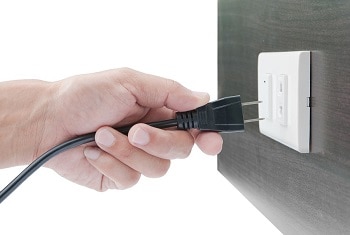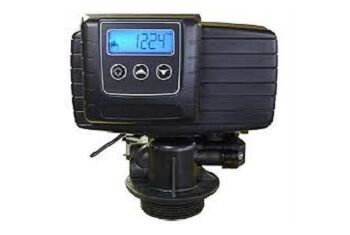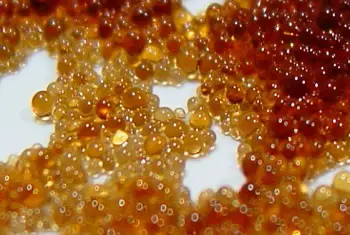UPDATED: June 18, 2022
The debate between electric and non-electric water softeners has been going on for years, so let’s discuss the differences between the two, and what they have in common.
An electric water softener uses an electric time clock, often in conjunction with a water meter to control when the water softener will perform its regeneration process. A non-electric water softener uses a water meter only to control when the water softener will perform its regeneration process.
All water softeners have one primary thing in common, they remove the hardness that can be found in water in order for the water to better clean our clothes, dishes, and ourselves, and to protect our plumbing and fixtures from hardness build-up.
Here’s What We Will Be Covering:
- The Difference Between An Electric And A Non-Electric Residential Water Softener?
- Do All Non-Electric Dual-Tank Water Softeners Alternate Softener Tanks?
- How Does A NON-Electric Water Softener Know How Much Water To Put In Its Brine Tank?
- Is An Electric Water Softener Better Than A NON-Electric Water Softener?
- A Benefit Of Having An Electric Water Softener Is Its Programmability.
- How Programmable Is An Electric Water Softener?
- Can I Program An Electric Water Softener To Not Regenerate When I’m On Vacation?
- The Process Of Removing Hardness From Water Is The Same With An Electric Or NON-Electric Water Softener.
- Electric Vs. NON-Electric Water Softener Comparison Chart
So what’s the big difference between an electric and a non-electric residential water softener?
The most obvious difference between the two is that one doesn’t use any electricity.

Is this really a big deal? Well, that is for you to decide.
Since the non-electric water softener uses no electricity, it simply has no programmability, and therefore it has no idea when is a good time for it to go into its regeneration process.
This is usually not a big deal if the water pressure in the home is very good. But if the water pressure in the home is less than ideal, a noticeable drop in pressure throughout the home may occur whenever the system needs to regenerate.
This regeneration process can happen at any time of day, and since it is triggered by water usage, it will always perform its regeneration when water is being used.
This is often not a problem if it happens when you are just washing your hands, but it can be a major inconvenience when it happens when you just started to take a shower, and you suddenly lose most of your water pressure.
A benefit of the dual tank non-electric water softener is that there is no loss of soft water while the system is in regeneration as it switches from one media tank to the other when the regeneration process starts. But this is not the case in all dual tank, non-electric water softening systems.
Do All Non-Electric Dual-Tank Water Softeners Alternate Softener Tanks?
Many of the larger-sized non-electric water softeners do not alternate tanks while in regeneration, and use considerably more water for their regeneration process.
These systems will cause a significant loss of water pressure in the home if the regular pressure is only average. And they will regenerate at any time of the day, and only when you are using water.
How Does A NON-Electric Water Softener Know How Much Water To Put In Its Brine Tank?
One major disadvantage of a non-electric water softener control valve is that it has no idea when to stop filling its brine tank.
On a non-electric water softener, there is always water trying to fill the salt tank after the system has gone through its regeneration process. The only thing stopping the salt tank from overflowing is a shut-off float in the tank that closes a valve that shuts the water off going into the tank.
If any little particle of dirt should get lodged in this shut-off valve, the water will not shut off and the salt tank could overflow, spilling salt water onto the floor until the homeowner happens to discover it.
An electric water softener puts a predetermined amount of water into its brine tank and stops the water from flowing into the brine tank at the control valve as well as having a shut-off float inside of the brine tank to prevent the brine tank from overflowing.
is an electric water softener better than a NON-electric water softener?
Well, I wouldn’t necessarily say that, but they are more programmable, which makes them more predictable and smarter.
First of all, let’s make sure that we understand just how little electricity an electric water softener actually uses.
Most of the time, an electric water softener is just allowing water to flow through it as the hardness gets removed from the water.
During this time, the only electricity being used is for the clock. This is the same amount of electricity that is used as the alarm clock that sits alongside your bed or the clock on your microwave oven.
The only time that an electric water softener uses more electricity than a standard alarm clock is during its regeneration process.
At this time, it uses a small electric motor to move a piston an inch or so a few times to change the route of the water flowing through the system. And that’s it!
A big benefit of having an electric water softener is its programmability.

Now it is true that during its regeneration process, the system is bypassed, and only un-treated water is available for use inside the home.
But thanks to the programmability of the system, this process is scheduled to happen when you are fast asleep so there is no water being used anyway.
Since the electric water softener only fills the salt tank with a predetermined amount of water and the salt tank has a backup shut-off float assembly, the chance of the salt tank overflowing is extremely small.
If you have weak to poor water pressure in your home, having a non-electric water softener that can regenerate at any time can be a real inconvenience.
Think about this!
You are in the shower with a head full of shampoo and all of a sudden your water softener begins its regeneration process. All of a sudden the strong steady stream of water that was coming from your shower head has dropped down to just a trickle.
And there you are, trying to rinse off with just a little stream of water dribbling from your shower.
What a frustrating way to start your day!
How programmable is an electric water softener?
Many electric water softeners on the market have very detailed and helpful programming features. Proper programming of your water softener can keep your system working more efficiently, make sure that the system does not interfere with your daily activities, and even keep a history of water usage and system operation.
The water softening resin that is in a water softener removing high amounts of hardness or iron needs to be kept clean and should be regenerated every few weeks even if no water has been used.
This is another great advantage of having a programmable electric water softener.
Most electric water softeners have a regeneration override function which will tell the water softener to regenerate every pre-programmed amount of days, even if you have not used enough water to trigger a normal regeneration.
Can I program An Electric water softener to not regenerate when I’m on vacation?
There is a vacation mode on several brands of electric water softeners that can easily be turned on when you are planning on being away.
By turning on this vacation mode, the system will not regenerate at all while you are gone. Since no water will be used by the water softener, you need not worry about it running out of salt or having any problems while you are enjoying your time away.
A NON-electric water softener will not regenerate when you are away on vacation as long as no water is used to trigger the regeneration process.
What if I don’t want my water softener regenerating a 2:00 am?
Not a problem!
With an electric water softener, you can easily re-program the time of regeneration to any time that you want.
Multiple people in a home can often have very different schedules. Find a time where the least amount of water is usually needed and set your system to regenerate at that time.
As you can see, there are benefits to both electric and non-electric water softeners. Consider all options and benefits carefully and choose the one that best fits your particular situation.
The process of removing hardness from water is the same with an electric or NON-electric water softener.

Both types of water softeners use the same, or very similar water softening resin in their tanks which attracts calcium and magnesium ions to them from the surrounding water, leaving the water soft.
This resin is also capable of removing iron and manganese from the water.
The water runs through the water softener tank and losses these hardness ions to the softening resin, which then will need to have the hardness removed from them so as to remove more hardness from the water as is needed.
Electric Vs. NON-Electric Water Softener Comparison Chart!
| Electric Water Softener | NON-Electric Water Softener | |
|---|---|---|
| Cost | $399.00 – $2000.00 * | $2000.00 – $4000.00 * |
| Common Sizes | Single 7″-13″ x 40″-54″ plus brine tank | Two 7″-10″ x 35″-54″ tanks side by side plus a brine tank |
| Water Softness | 0 hardness | 0 hardness |
| Regular Maintenance | Add salt | Add salt, change water-sediment prefilter |
| Water Usage | Generally requires MORE water per regeneration but regenerates less often | Generally requires LESS water per regeneration but regenerates more often |
| Salt Usage | Uses more salt per regeneration, LESS efficient salt usage | Uses less salt per regeneration, MORE efficient salt usage |
| Electric Usage | Minimal. About as much as a digital clock radio | None |
| Reliability | Very reliable because of its simple design | The reliable, but more complicated design makes it susceptible to more problems |
| Repair Costs | Minimal, most parts are reasonably priced and easy to replace | Can be expensive because of complicated design and specialized parts |
| Chance of Overflowing | Extremely rare, brine tank water shut-offs at valve and brine tank | Not common, single brine tank water shut-off in the brine tank |
To Sum Up!
Both electric and non-electric softeners need to use a brine solution created by the dissolving of salt into water provided by the water softener in the salt tank. This brine solution works the same whether the softener is controlled by a water meter only, or by an electric time clock.



Thank you! Very informative! Since my wife and I travel a lot and leave our home unattended for about 7-10 days, based upon your analysts, we should choose electric.
Hello Ken, I’m glad that I could help.
Take a look at my Recommended Water Softeners to get an idea of which will be best for your home.
Have a great day!
Paul
Thanks for the explanation. I live in rural Texas and water pressure is a problem in some parts of the house and not in others. We suspect plumbing isn’t ideal, but without paying for testing etc. we are just guessing.
That said, I can get a Culligan system for about $6000 or a Kinetico for about $7500. Both filter the water and remove odors etc. Both have the carbon filters and the RO system under sink. Basically, the same in what they do.
Culligan has a recurring monthly payment to cover service and so on. Kinetico says they offer 1 year parts/labor and then a flat $135 for any service call labor. Parts are covered 100% for 10 years.
salt in Culligan will be several bags a quarter (delivered) and Kinetico says one bag will last 4 to 6 months.
I’m wondering which would be the better choice. Any thoughts?
Thanks
Tony
Hello Mr. Ellis and thank you for the question.
Without knowing the characteristic of your water, I could not recommend either system to you. I’m sure that both systems should work fine for softening your water but do you need a carbon filter to remove any odors or to help with odd tastes that may be removed by carbon?
Having a reverse osmosis system under your sink is a nice add-on to any system if you have excessive dissolved solids in your water, but many people don’t have as bad of water as they might think. If you would like me to give you my suggestion, please let me know a few things about your water.
Are you on a private well or municipal water?
What is your water hardness?
What is your water pH?
Is there any iron in your water? If so, how much?
What is the sulfur level in your water?
What is the amount of TDS (Total Dissolved Solids) in your water?
Culligan and Kinetico are fine systems, but you can often find a perfect system for much less depending on what needs to be addressed about your water. Also, please be aware that once you purchase either system, you will only be able to your systems serviced by that company and both of those systems can be rather expensive when it comes to maintenance.
You could expect to pay $300 or more per year just to have the filters changed for either reverse osmosis drinking water system, so I suggest that you do some research before buying either.
I would be happy to look at your water characteristics for you if you like.
I hope this was helpful to you.
Paul
I want to install a water softener as I live in a very hard water area. I have a very small kitchen and mains comes into the house under my sink, where there’s not enough space for a conventional water softener. My plumber has suggested a non-electric Monarch Scaleout XP as an alternative. I think this works on a different system but will it be effective and how does it compare to more conventional/ electric water softeners?
Hello Eileen and thank you for the question.
I am not an expert on the Monarch Scaleout XP but it looks like it is not actually a water softener but a descaler. A descaler does not use salt but does not actually soften your water. It masks the hardness in the water so that it does not build-up on your water fixtures.
Unfortunately, no-salt water descalers usually need the media inside of the tank replaced frequently, sometimes as often as every year which can be costly in the long run.
There are very compact conventional water softeners that might be a better choice as they should last you many years before any substantial service will need to be done.
I hope this was helpful.
Paul